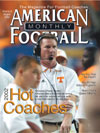AMERICAN FOOTBALL MONTHLY THE #1 RESOURCE FOR FOOTBALL COACHES
Article CategoriesAFM Magazine
|
Are Football Coaches Overpaid?A Discussion of the Coaches Compensation Issueby: Thom Park, Ph.D © More from this issue Washington Redskins Head Football Coach Steve Spurrier is probably the highest paid football coach in the world today. Coach Spurrier is reportedly contracted to earn $25,000,000.00 over a five year term, a deal valued at $5 million dollars annually. Despite that he may also be one of the best coaches, he has little need to worry about 3% inflation. After all, Notre Dameís Knute Rockne was highly compensated too at $80,000.00 per year in the late 1920ís when he was the top paid football coach. The very best people usually do well in any field. With the very top NCAA Division 1A head football coaches being paid well over $2,000,000.00 in total annual compensation, their critics leap ....The full article can only be seen by subscribers. Subscribe today!
|
|
|||||||
| HOME |
MAGAZINE |
SUBSCRIBE | ONLINE COLUMNISTS | COACHING VIDEOS |
Copyright 2025, AmericanFootballMonthly.com
All Rights Reserved





